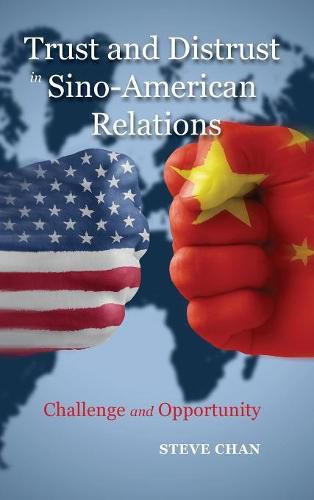Readings Newsletter
Become a Readings Member to make your shopping experience even easier.
Sign in or sign up for free!






This title is printed to order. This book may have been self-published. If so, we cannot guarantee the quality of the content. In the main most books will have gone through the editing process however some may not. We therefore suggest that you be aware of this before ordering this book. If in doubt check either the author or publisher’s details as we are unable to accept any returns unless they are faulty. Please contact us if you have any questions.
This book is part of the Rapid Communications in Conflict and Security (RCCS) Series (General Editor: Geoffrey R.H. Burn).
Trust is a concept that ought to be at the front and center of international relations research. It is pivotal to how states interpret the actions of others and decide their own policies. Mutual distrust can set off a spiral of competitive dynamics as a consequence of reciprocal misinterpretation of each other’s intentions. At the same time, misplacing one’s confidence in a state that is actually untrustworthy can seriously jeopardize a country’s security. Yet despite its analytic and policy importance, only a few books have given systematic attention to this pivotal concept.
Trust and Distrust in Sino-American Relations: Challenge and Opportunity fills that gap by addressing the question of how states acquire a reputation for trustworthiness–or untrustworthiness–in the eyes of others. It focuses especially on the relationship between China and the U.S., the two most consequential countries in today’s world, offering a systematic framework for analyzing their level of trust, and examining how ongoing trends and prospective developments may foster or undermine this relationship. In this, it provides a new approach to the subject by applying theoretical insights and empirical generalizations from the international relations literature to the case of Sino-American relations.
Based on this analysis, Steve Chan argues that mutual strategic restraint holds the key to building trust in Sino-American relations–a demanding requirement in that it exhorts both sides to accept limits on their use of military force, to observe treaty obligations and international conventions, and to respect each other’s traditional sphere of influence. It also commits leaders on both sides to easing rather complicating the political challenges facing their counterparts as they seek to reconcile their domestic and foreign needs and desires. Chan posits though that it will probably take a major development to precipitate this new thinking in both countries.
The book will be of use to international relations scholars and students, China specialists, legislators, policy analysts, and practitioners in various branches of government.
$9.00 standard shipping within Australia
FREE standard shipping within Australia for orders over $100.00
Express & International shipping calculated at checkout
This title is printed to order. This book may have been self-published. If so, we cannot guarantee the quality of the content. In the main most books will have gone through the editing process however some may not. We therefore suggest that you be aware of this before ordering this book. If in doubt check either the author or publisher’s details as we are unable to accept any returns unless they are faulty. Please contact us if you have any questions.
This book is part of the Rapid Communications in Conflict and Security (RCCS) Series (General Editor: Geoffrey R.H. Burn).
Trust is a concept that ought to be at the front and center of international relations research. It is pivotal to how states interpret the actions of others and decide their own policies. Mutual distrust can set off a spiral of competitive dynamics as a consequence of reciprocal misinterpretation of each other’s intentions. At the same time, misplacing one’s confidence in a state that is actually untrustworthy can seriously jeopardize a country’s security. Yet despite its analytic and policy importance, only a few books have given systematic attention to this pivotal concept.
Trust and Distrust in Sino-American Relations: Challenge and Opportunity fills that gap by addressing the question of how states acquire a reputation for trustworthiness–or untrustworthiness–in the eyes of others. It focuses especially on the relationship between China and the U.S., the two most consequential countries in today’s world, offering a systematic framework for analyzing their level of trust, and examining how ongoing trends and prospective developments may foster or undermine this relationship. In this, it provides a new approach to the subject by applying theoretical insights and empirical generalizations from the international relations literature to the case of Sino-American relations.
Based on this analysis, Steve Chan argues that mutual strategic restraint holds the key to building trust in Sino-American relations–a demanding requirement in that it exhorts both sides to accept limits on their use of military force, to observe treaty obligations and international conventions, and to respect each other’s traditional sphere of influence. It also commits leaders on both sides to easing rather complicating the political challenges facing their counterparts as they seek to reconcile their domestic and foreign needs and desires. Chan posits though that it will probably take a major development to precipitate this new thinking in both countries.
The book will be of use to international relations scholars and students, China specialists, legislators, policy analysts, and practitioners in various branches of government.